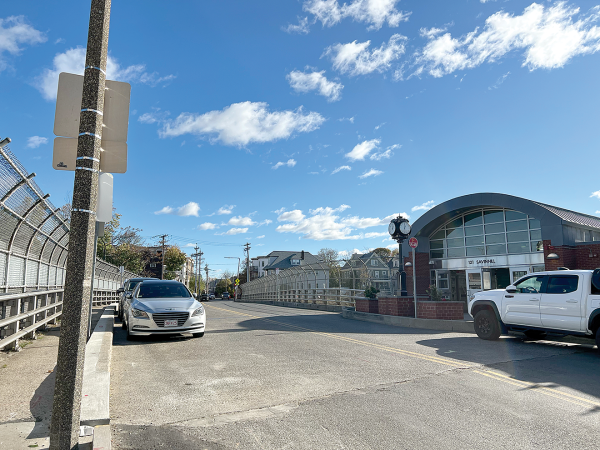November 13, 2024

The MBTA hopes to secure federal grant money to pay for the design and reconstruction of this bridge on Savin Hill Avenue, which is partly owned and maintained by the T. Cassidy McNeeley photo
The MBTA recently applied for federal grants that would begin the process of replacing a portion of the bridge that carries Savin Hill Avenue over T tracks and another that would fund the design and reconstruction of the JFK-UMass station.
The T reached out to the Columbia-Savin Hill Civic Association (CSHCA) this month to seek letters of support for both grants.
The Savin Hill Bridge was closed on an emergency basis last year when a beam was compromised and needed immediate replacement. The MBTA is seeking an $800,000 grant from a pot of about $20 million nationally that would pursue a “type study/feasibility analysis for the replacement of the MBTA-owned portion of the Savin Hill Avenue Bridge, a vital link for multimodal regional connectivity in the Dorchester neighborhood,” reads a memo shared by the MBTA.
The MBTA owns the western half of the bridge and MassDOT owns the eastern half – but the MBTA’s portion is in far worse shape, according to engineering studies cited in the memo.
“The MBTA-owned half of this bridge is ready to be replaced – if funds are awarded, the MBTA will move forward with analyzing all costs, safety aspects, and feasibilities of constructing its replacement,” read a statement to The Reporter.
The Savin Hill neighborhood has been heavily impacted by diversions and lane closures on the bridge and nearby streets by infrastructure work, including last year’s emergency bridge work, and excavation projects from Boston Water and Sewer Commission, Eversource, and National Grid projects.
Paul Nutting, Jr., an abutter to the bridge, said he understands the need to replace the span as there have been safety issues, but he hopes it will be managed well.
“Let’s not let it turn into another [Dot Ave bridge] because that thing dragged on so long and was even closed to pedestrians for a long time,” he said, citing the multi-year bridge replacement of an MBTA span on Dorchester Avenue that stretched from 2022 to 2024. “That would be an untenable situation.”
Nutting said he hopes they can always keep one lane of traffic open during construction rather than shutting down the bridge completely.
“My hope would be they would have cops there to keep one lane open and allow alternating eastbound and westbound traffic through,” he noted. “Looking at the way it's constructed, I don’t see why they couldn’t do that.”
Bill Walczak, president of the CSHCA, said he was glad to see it was being replaced, recalling the situation last year where the bridge was closed, and no parking was allowed due to concerns about the bridge’s stability. Walczak said things should never get that far, and advocated for a more reliable funding mechanism for bridges instead of a competitive grant that may or may not materialize.
“We did have our bridge closed about a year ago because of an emergency situation with a beam under the MBTA portion of the bridge,” he noted. “It feels like we have to play the lottery with a grant proposal to study a bridge they know is already structurally deficient. It seems like we should have a plan to allocate dollars to fix these things and not wait for some special opportunity from a federal spending law.”
According to the National Bridge Inventory (NBI) cited by the MBTA, the western half is in poor condition. The latest bridge inspection report notes critical structural deficiencies, critical hazard deficiencies, and severe or major deficiencies that warrant bridge replacement. The bridge was built in 1925 but modified in 1956 and 1967. It links the eastern and western halves of Savin Hill, carrying pedestrians, more than 2.4 million passenger vehicles, and over 190,000 trucks every year.
The MBTA-owned portion of the bridge carries traffic across five MBTA-owned rail tracks: four of which carry heavy rail and one Regional Rail track. The bridge also provides pedestrian access to the main (and only accessible) entrance to Savin Hill station on the Ashmont branch of the Red Line.
The second federal grant sought by the T would fund the design and construct the JFK-UMass station — in the form of a $99.9 million US Department of Transportation matching grant that would advance final design and fund reconstruction. The MBTA would finance its amount for the $200 million project through revenue bonds.
The agency “is eager to advance this project to redevelop JFK/UMass, which will significantly benefit the Dorchester community as a whole, including staff and students at UMass Boston, residents of the surrounding area, and many more,” read a statement to The Reporter from the T.
The MBTA is hoping to get the funding from the federal Reconnecting Communities Pilot Program, which is also a competitive grant program funded by the Bipartisan Infrastructure Law. The program has $607 million available through Federal Fiscal Year 2026.
“JFK/UMass Station currently presents significant barriers to access, mobility, and economic development and is poorly suited to the community, as it is in a state of disrepair,” read the T memo. “In recent decades, there have been increases in safety events, resiliency failures, and maintenance concerns. JFK/UMass Station is located in Dorchester, a historically disadvantaged neighborhood.”
The MBTA elaborated that the overall project aims to create a safe, efficient, and accessible station that employs flood-mitigation technologies and advances possible transit-oriented development.


